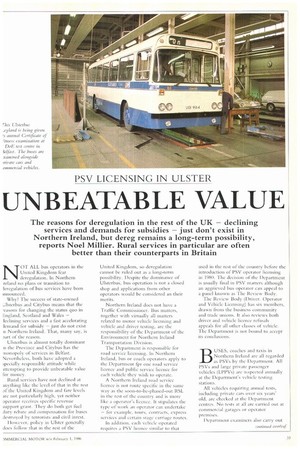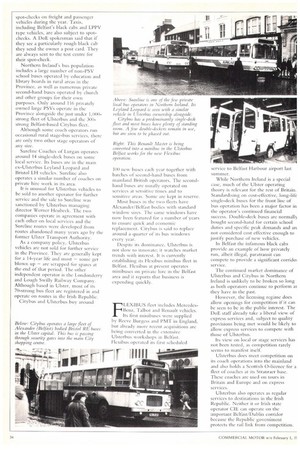UNBEATABLE VALUE
Page 33

Page 34

If you've noticed an error in this article please click here to report it so we can fix it.
The reasons for deregulation in the rest of the UK — declining services and demands for subsidies — just don't exist in Northern Ireland, but dereg remains a long-term possibility, reports Noel Millier. Rural services in particular are often better than their counterparts in Britain
NOT ALL bus operators in the United Kingdom fear deregulation. In Northern reland no plans or transition to leregulation of bus services have been umounced.
Why? The success of state-owned LAsterbus and Citybus means that the -easons for changing the status quo in England, Scotland and Wales — kenning services and a fast accelerating lemand fir subsidy — just do not exist .n Northern Ireland. That, many say, is part of the reason.
Ulsterbus is almost totally dominant in the Province and Citybus has the monopoly of services in Belfast. Nevertheless, both have adopted a ;pecially responsible attitude while attempting to provide unbeatable value For money.
Rural services have not declined at anything like the level of that in the rest of the United Kingdom and fare levels arc not particularly high, yet iwither Ope ra tor receives specific revenue support grant. They do both get fuel duty rebate and compensation for buses destroyed by terrorists and civil inrest.
I lowever, policy in Ulster generally does follow that in the rest of the United Kingdom, so deregulation cannot be ruled out as a long-term possibility. Despite the &main:ince of Ulsterbus, bus operation is not a closed shop and applications from other operators would be considered an their merits.
Northern Ireland does not have a Traffic Commissioner. Bus matters, together with virtually all matters related to motor vehicle licensing, and vehicle and driver testing, arc the responsibility of the Department of the Environment for Northern Ireland Transportation Division.
The Department is responsible for road service licensing. In Northern Ireland, bus or coach operators apply to the Department fpr one road service licence and public service licence for each vehicle they wish to operate.
A Northern Ireland road service licence is not route specific in the same way as the soon-to-bc-phased-out 12SL in the rest of the country and is more like a operator's licence, It stipulates the type of work an operator can undertake — for example, tours, contracts, express services and certain stage carriage routes.
In addition, each vehicle operated requires a PSV licence similar to that
used in the rest of the country hefore the introduction of PSV operator licensing in 1980. The decision of the I lepartment is usually final in PSV matters although an aggrieved bus operator can appeal to a panel known as The Review Body.
The Review Body (Driver. Operator and Vehicle Licensing) has six members. drawn from the business community and trade unions. It also reviews both driver and vehicle licence refusals appeals for all other classes of vehicle, The Department is not bound to accept its conclusions.
BUSES, coaches and taxis in Northern Ireland are all regarded as PSVs by the Department. All PSVs and large private passenger vehicles (LPPVs) are inspected annually at the Department's vehicle testing stations.
All vehicles requiring annual tests, including private cars over six years' old, are checked at the Department centres, No tests at all are carried out at commercial garages or operator premises.
Department examiners also carry out spot-checks on freight and passenger vehicles during the year. Taxis, including Belfast's black cabs and LPPV type vehicles, are also subject to spotchecks. A DoE spokesman said that if they see a particularly rough black cab they send the owner a post card. They are always sent to the test centre for their spot-check.
Northern Ireland's bus population includes a large number of non-PSV school buses operated by education and library boards in rural areas in the Province, as well as numerous private second-hand buses operated by church and other groups for their own purposes. Only around 116 privately owned large PSVs operate in the Province alongside the just under 1,0i)0strong fleet of Ulsterbus and the 300strong Belfast-based Citybus fleet.
Although some coach operators run occasional rural stage-bus services, there are only two other stage operators of any size.
Sureline Coaches of Lurgan operates around 14 single-deck buses on some local service. Its buses are in the main ex-Ulsterbus Leyland Leopard and Bristol LH vehicles. Sureline also operates a similar number of coaches on private hire work in its area.
It is unusual for Ulsterbus vehicles to be sold to another operator for further service and the sale to Sureline was sanctioned by Ulsterbus managing director Werner Heubeck. The two companies operate in agreement with each other on local services and the Sureline routes were developed from routes abandoned many years ago by the former Ulster Transport Authority.
As a company policy, Ulsterbus vehicles are not sold for further service in the Province. They are generally kept for a 14-year life and most sonic get blown up are scrapped for spares at the end of that period. The other independent operator is the Londonderry and Lough Swilly Railway Company. Although based in Ulster, most of its 70-strong bus fleet are registered in and operate on routes in the Irish Republic.
Citybus and Ulsterbus buy around
10(1 new buses each year together with batches of' second-hand buses from mainland British operators. The secondhand buses are usually operated on services at sensitive times and to sensitive areas. Some are kept in reserve.
Most buses in the two fleets have Alexander! Belfast bodies with standard window sizes. The same windows have now been featured for a number of years to ensure quick and economic replacement. Citybus is said to replace around a quarter of its bus windows every year.
Despite its dominance, Ulsterbus is not slow to innovate; it watches market trends with interest. It is currently establishing its Flexibus minibus fleet in Belfast. Flexibus at present operates minibuses on private hire in the Belfast area and it reports that business is expending quickly.
FLEXIBUS fleet includes MercedesBenz, Talbot and Renault vehicles. Its first minibuses were supplied by Reeve Burgess and PMT in England, but already more recent acquisitions are being converted in the extensive Ulsterbus workshops in Belfast.
Flexibus operated its first scheduled
service to Belfast Harbour airport last summer.
While Northern Ireland is a special case, much of the Ulster operating theory is relevant for the rest of Britain. Standardising on cost-effective, long-life single-deck buses for the front line of bus operation has been a major factor in the operator's continued financial success. Double-deck buses are normall) bought second-hand for certain school duties and specific peak demands and arc not considered cost effective enough to justify purchase of new vehicles.
In Belfast the infamous black cabs provide an example of how privately run, albeit illegal, paratransit can compete to provide a significant corridol service.
The continued market dominance of Ulsterbus and Citybus in Northern Ireland is unlikely to be broken so long as both operators continue to perform as they have in the past.
However, the licensing regime does allow openings for competition if it can be seen to be in the public interest. The DoE staff already take a liberal view of express services and, subject to quality provisions being met would be likely to allow express services to compete with those of Ulsterbus.
Its view on local or stage services has not been tested, as competition rarely seems to manifest itself.
Ulsterbus does meet competition on its coach operations into the mainland and also holds a Scottish 0-licence for a fleet of coaches at its Stranraer base. These coaches are used on tours in Britain and Europe and on express services.
Ulsterbus also operates as regular services to destinations in the Irish Republic. Neither it or Irish state operator CIE can operate on the important Belfast/Dublin corridor because the Republic goverriment protects the rail link from competition.




















































